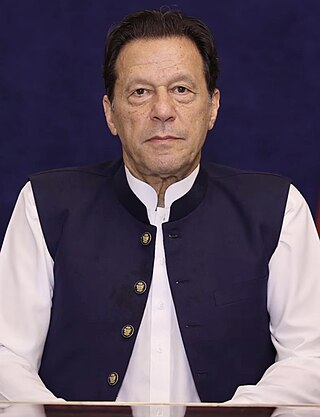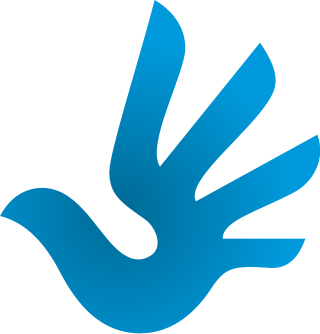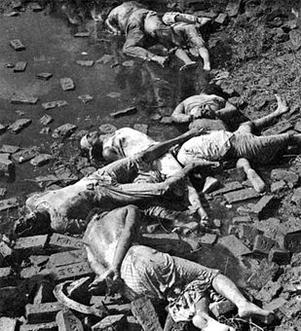
The Organisation of Islamic Cooperation, formerly the Organisation of the Islamic Conference, is an intergovernmental organization founded in 1969. It consists of 57 member states, 48 of which are Muslim-majority. The organisation claims to be "the collective voice of the Muslim world" and works to "safeguard and protect the interests of the Muslim world in the spirit of promoting international peace and harmony".
Islamophobia is the irrational fear of, hostility towards, or hatred against the religion of Islam or Muslims in general. Islamophobia is primarily a form of religious or cultural bigotry; and people who harbour such sentiments often stereotype Muslims as a geopolitical threat or a source of terrorism. Muslims, with diverse ethnic and cultural backgrounds, are often inaccurately portrayed by Islamophobes as a single homogenous racial group.
A United Nations General Assembly resolution is a decision or declaration voted on by all member states of the United Nations in the General Assembly.

Imran Ahmed Khan Niazi is a Pakistani politician and former cricketer who served as the 19th prime minister of Pakistan from August 2018 until April 2022. He is the founder and former chairman of the political party Pakistan Tehreek-e-Insaf (PTI) from 1996 to 2023. He was the captain of the Pakistan national cricket team throughout the 1980s and early 1990s.

The Bangladesh Liberation War, also known as the Bangladesh War of Independence and known as the Liberation War in Bangladesh, was an armed conflict sparked by the rise of the Bengali nationalist and self-determination movement in East Pakistan, which resulted in the independence of Bangladesh. The war began when the Pakistani military junta based in West Pakistan—under the orders of Yahya Khan—launched Operation Searchlight against East Pakistanis on the night of 25 March 1971, initiating the Bangladesh genocide.
The Muslim Council of Britain (MCB) is an umbrella body of Muslim organisations in the United Kingdom, with over 500 affiliated mosques and organisations. It was formed in 1994 in response to British government's expressed wish for a single representative body of Muslims it could talk to. It has been called the best known and most powerful of the Muslim organisations founded since 1990.

Human Rights Day (HRD) is celebrated annually around the world on 10 December every year.

Sir Chaudhry Muhammad Zafarullah Khan was a Pakistani jurist and diplomat who served as the first Foreign Minister of Pakistan. After serving as foreign minister he continued his international career and is the only Pakistani to preside over the International Court of Justice. He also served as the President of the UN General Assembly. He is the only person to date to serve as the President of both UN General Assembly and the International Court of Justice.

The Bosnian genocide took place during the Bosnian War of 1992–1995 and included both the Srebrenica massacre and the wider crimes against humanity and ethnic cleansing campaign perpetrated throughout areas controlled by the Army of Republika Srpska (VRS). The events in Srebrenica in 1995 included the killing of more than 8,000 Bosniak men and boys, as well as the mass expulsion of another 25000–30000 Bosniak civilians by VRS units under the command of General Ratko Mladić.

Fazal-ur-Rehman is a Pakistani politician who is the president of Jamiat Ulema-e-Islam (F). He is also the president of the Pakistan Democratic Movement (PDM), a coalition of political parties which ousted then prime minister Imran Khan through a no-confidence motion in 2022. He has been a member of the National Assembly since February 2024 and previously served in that position between 1988 and 2018. He was also the Leader of the Opposition from 2004 to 2007. He is a supporter of the Taliban government in Afghanistan and has demanded for its international recognition. In the 1980s, he was part of the Movement for the Restoration of Democracy (MRD), which was formed to end the military regime of General Zia-ul-Haq.

The Bangladesh genocide was the ethnic cleansing of Bengalis, especially Bengali Hindus, residing in East Pakistan during the Bangladesh Liberation War, perpetrated by the Pakistan Armed Forces and the Razakars. It began on 25 March 1971, as Operation Searchlight was launched by West Pakistan to militarily subdue the Bengali population of East Pakistan; the Bengalis comprised the demographic majority and had been calling for independence from the Pakistani state. Seeking to curtail the Bengali self-determination movement, erstwhile Pakistani president Yahya Khan approved a large-scale military deployment, and in the nine-month-long conflict that ensued, Pakistani soldiers and local pro-Pakistan militias killed between 300,000 and 3,000,000 Bengalis and raped between 200,000 and 400,000 Bengali women in a systematic campaign of mass murder and genocidal sexual violence. In their investigation of the genocide, the Geneva-based International Commission of Jurists concluded that Pakistan's campaign involved the attempt to exterminate or forcibly remove a significant portion of the country's Hindu populace.

The International Holocaust Remembrance Day, or the International Day in Memory of the Victims of the Holocaust, is an international memorial day on 27 January that commemorates the victims of the Holocaust, which resulted in the genocide of one third of the Jewish people, along with countless members of other minorities by Nazi Germany between 1933 and 1945, an attempt to implement its "final solution" to the Jewish question. 27 January was chosen to commemorate the date when the Auschwitz concentration camp was liberated by the Red Army in 1945.

Armenian genocide recognition is the formal acceptance of the fact that the Ottoman Empire's systematic massacres and forced deportation of Armenians from 1915 to 1923, both during and after the First World War, constituted genocide.
Defamation of religion is an issue that was repeatedly addressed by some member states of the United Nations (UN) from 1999 until 2010. Several non-binding resolutions were voted on and accepted by the UN condemning "defamation of religion". The motions, sponsored on behalf of the Organization of the Islamic Conference (OIC), now known as the Organisation of Islamic Cooperation, sought to prohibit expression that would "fuel discrimination, extremism and misperception leading to polarization and fragmentation with dangerous unintended and unforeseen consequences". Religious groups, human rights activists, free-speech activists, and several countries in the West condemned the resolutions arguing they amounted to an international blasphemy law. Critics of the resolutions, including human rights groups, argued that they were used to politically strengthen domestic anti-blasphemy and religious defamation laws, which are used to imprison journalists, students and other peaceful political dissidents.

The history of the Islamic Republic of Pakistan began on 14 August 1947 when the country came into being in the form of Dominion of Pakistan within the British Commonwealth as the result of Pakistan Movement and the partition of India. While the history of the Pakistani Nation according to the Pakistan government's official chronology started with the Islamic rule over Indian subcontinent by Muhammad bin Qasim which reached its zenith during Mughal Era. In 1947, Pakistan consisted of West Pakistan and East Pakistan. The President of All-India Muslim League and later the Pakistan Muslim League, Muhammad Ali Jinnah became Governor-General while the secretary general of the Muslim League, Liaquat Ali Khan became Prime Minister. The constitution of 1956 made Pakistan an Islamic democratic country.

Nadia Murad Basee Taha is an Iraqi-born Yazidi human rights activist based in Germany. In 2014, during the Yazidi genocide by the Islamic State, she was abducted from her hometown of Kocho in Iraq. Much of her community was massacred. After losing most of her family, Murad was held as an Islamic State sex slave for three months, alongside thousands of other Yazidi women and girls.

The Yazidi genocide was perpetrated by the Islamic State in Iraq and Syria between 2014 and 2017. It was characterized by massacres, genocidal rape, and forced conversions to Islam. The Yazidis who are Ethnoreligious group who practice Yazidism, a monotheistic Iranian ethnoreligion derived from the pre Indo-Iranian tradition.
Allegations of Islamophobia in the UK Conservative Party have been made, including against senior politicians, such as Boris Johnson, Michael Gove and Zac Goldsmith. Baroness Warsi, former co-chair of the Conservative Party, said in 2018 that anti-Muslim prejudice had "poisoned" the party. Many Muslim party members welcomed Warsi's comments, saying that they felt the issue had been marginalised within the party.

Genocide recognition politics are efforts to have a certain event (re)interpreted as a "genocide" or officially designated as such. Such efforts may occur regardless of whether the event meets the definition of genocide laid out in the 1948 Genocide Convention.

In April 2022, a no-confidence motion against Imran Khan led to his removal as the prime minister of Pakistan. Based largely on the Westminster system of legislature, the prime minister commands confidence of the majority of the lower house of Parliament, the National Assembly of Pakistan, under clause (2A) of Article 91 of the Constitution. Numerous opposition parties joined forces to file the motion of no confidence against Imran Khan in the National Assembly. It ultimately led to the removal of Khan from office as a majority passed the motion in the Lower House.














